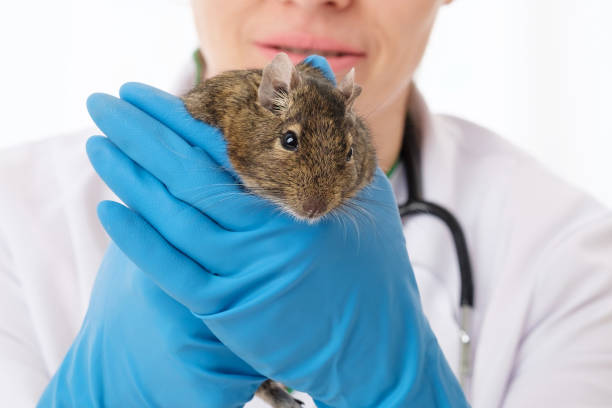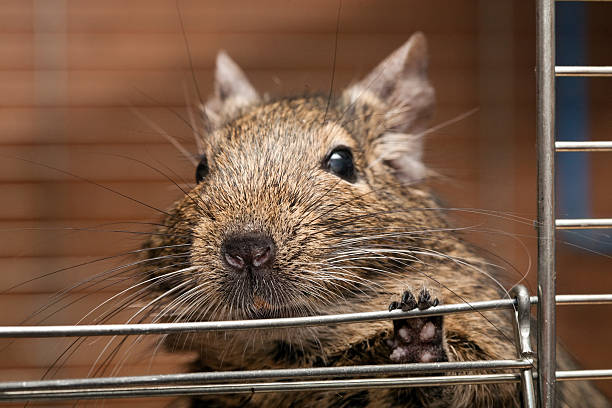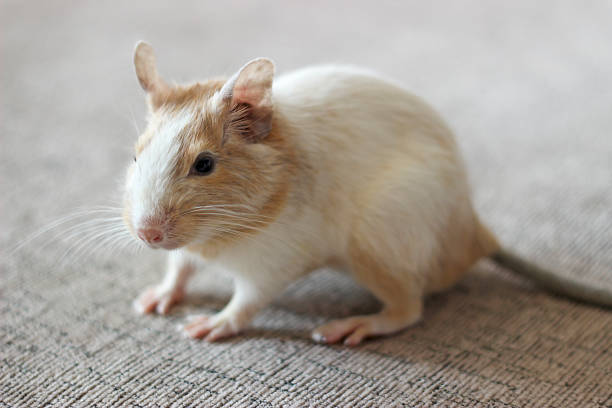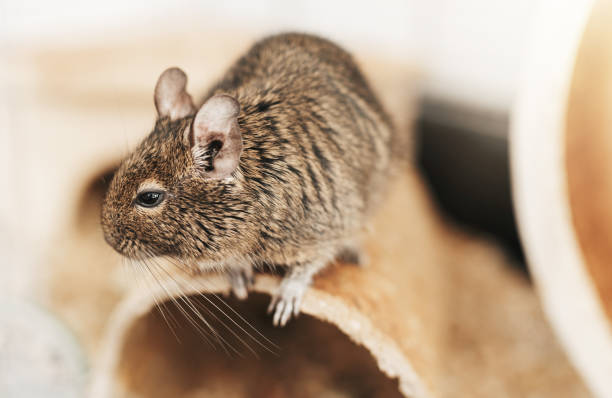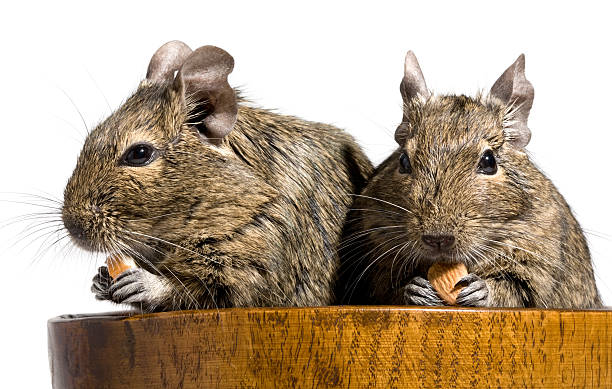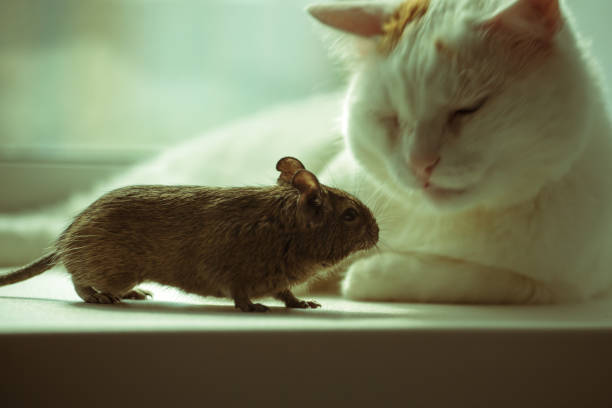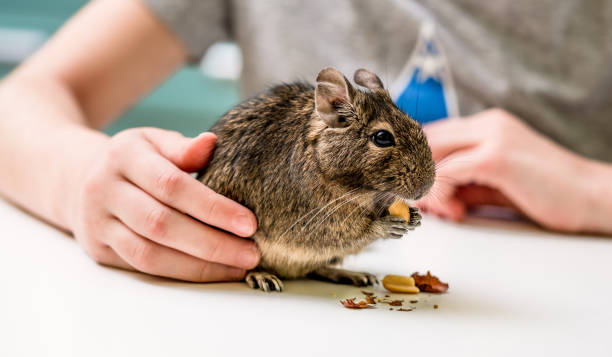Degu Health 101: Common Issues and Preventive Care
This post contains affiliate links. This means I will make a commission at no extra cost to you should you click through and make a purchase. Read the full disclosure here.
Degus are delightful and sociable rodents, but like any pet, they require vigilant attention to their health and well-being. In this guide, we will delve into the world of degu health, exploring common issues that these furry companions may encounter and providing valuable insights into preventive care measures.
Degu health is a multifaceted topic that encompasses dental care, weight management, respiratory health, and much more. By the end of this guide, you’ll have the knowledge and tools necessary to keep your degus thriving.
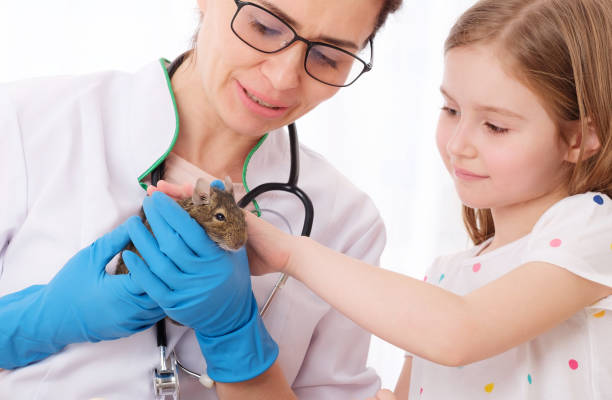
Common Health Issues
Understanding the common health issues that degus may face is the first step in ensuring their well-being. While these charming rodents are generally hardy, there are several health concerns that can arise. In this section, we’ll take a closer look at some of these issues and learn how to identify them early.
1. Dental Problems:
- Why Dental Health Matters: Degus have open-rooted teeth that continuously grow throughout their lives. If their teeth become too long or misaligned, it can lead to serious dental problems.
- Symptoms to Watch For: Keep an eye out for signs such as difficulty eating, drooling, weight loss, and reluctance to chew. These can all indicate dental issues.
2. Obesity:
- The Dangers of Obesity: Just like humans, degus can become overweight, which can lead to a range of health problems, including heart disease and diabetes.
- Spotting Obesity: Feel your degu’s body. You should be able to feel its ribs without pressing too hard. If you can’t, it might be time to adjust your diet and exercise routine.
3. Respiratory Infections:
- Respiratory Vulnerability: Degus are prone to respiratory infections, especially when exposed to drafts or cold temperatures.
- Recognizing Respiratory Problems: Listen for wheezing, sneezing, or labored breathing. Watery eyes or nasal discharge can also be signs of respiratory issues.
4. Parasite Infestations:
- Common Parasites: Mites and fleas are common external parasites that can affect degus. Internal parasites like worms can also be a concern.
- Preventive Measures: Regularly clean and disinfect your degus’ living space and provide them with a clean environment. Consult your veterinarian for appropriate parasite control measures.
It’s important to remember that early detection of health issues is key to successful treatment. Regularly observe your degus for any changes in behavior or physical appearance. If you notice any concerning signs, don’t hesitate to seek advice from a qualified veterinarian who specializes in small rodents.
Dental Health

Dental health is a paramount concern for Degus. These little rodents have ever-growing teeth, which means that their dental well-being requires constant attention. Ignoring their dental needs can lead to painful problems and serious health issues. Let’s delve deeper into understanding and maintaining your degus’ dental health.
Why Dental Health Matters for Degus:
Degus’ teeth grow continuously, roughly 1-2 mm per week. This growth is usually kept in check through natural wear from chewing. However, when their teeth don’t wear down correctly, dental problems can arise.
Common Dental Issues:
- Overgrowth: Degus can experience overgrown incisors (front teeth) or molars (back teeth). Overgrown teeth can lead to discomfort, difficulty eating, and even injury to the mouth.
- Malocclusion: This condition occurs when the incisors or molars do not align correctly, causing uneven wear and potential dental problems.
Recognizing Dental Problems:
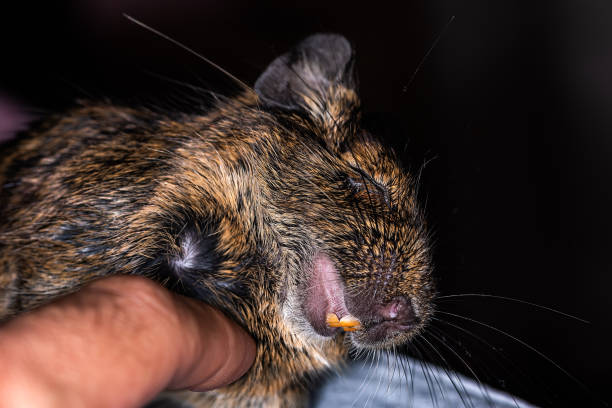
Being vigilant about your degus’ dental health is crucial. Watch for these signs of dental issues:
- Drooling: Excessive drooling or wetness around the mouth can indicate oral discomfort.
- Weight Loss: Difficulty eating due to dental problems can lead to weight loss.
- Chewing Problems: If your degus suddenly stop chewing on toys or harder foods, it might be a sign of dental issues.
Preventing Dental Problems:
- Dietary Management: Provide a diet that encourages the natural wear of teeth. This includes offering hay, wooden chew toys, and safe branches for chewing.
- Regular Checkups: Schedule regular vet checkups to monitor your degus’ dental health. Your vet may need to trim overgrown teeth.
- Chew Toys: Offer a variety of chew toys and materials to keep their teeth worn down.
- Maintain Proper Temperature: Ensure your degus’ habitat is kept at a suitable temperature. Sudden drops in temperature can stress them and contribute to dental problems.
Remember, dental issues can escalate quickly, so it’s essential to address them promptly. If you suspect any dental problems or notice changes in your degus’ eating habits, consult with a veterinarian experienced in treating small rodents. They can provide guidance on maintaining your degus’ dental health and ensuring their overall well-being.
Weight Management
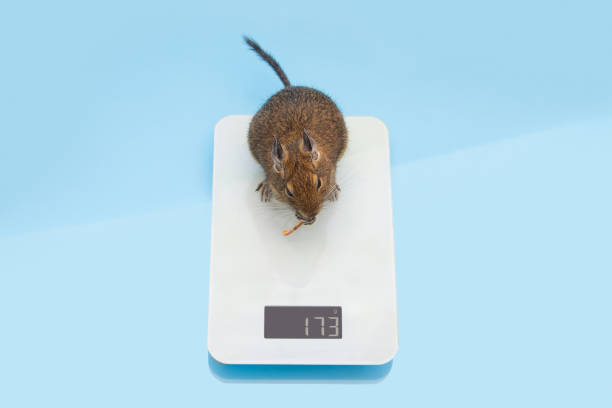
Maintaining a healthy weight is fundamental to your degus’ overall well-being. Just like humans, degus can face health problems associated with obesity if their weight is not carefully managed. In this section, we’ll discuss why weight management is essential and provide guidelines on keeping your degus at a healthy weight.
The Dangers of Obesity:
Obesity in degus can lead to a host of health issues, including:
- Heart Disease: Excess weight puts strain on the heart, increasing the risk of heart disease.
- Diabetes: Obesity can lead to insulin resistance and diabetes in degus.
- Joint Problems: Heavier degus are more prone to joint issues, which can cause pain and mobility problems.
Spotting Obesity:
It’s crucial to recognize the signs of obesity in your degus:
- Body Condition: You should be able to feel your degus’ ribs without pressing too hard. If their ribs are difficult to detect, they may be overweight.
- Fat Pads: Check for fat pads near the base of their tail and around the abdomen. These can be signs of excess fat.
- Decreased Activity: Overweight degus may be less active, spending more time resting and less time exploring or playing.
Guidelines for Maintaining a Healthy Weight:
- Balanced Diet: Provide a balanced diet rich in hay, fresh vegetables, and high-quality degu pellets. Limit sugary treats and fatty foods.
- Portion Control: Measure your degus’ food portions to prevent overeating. Follow feeding guidelines provided by your veterinarian.
- Regular Exercise: Encourage physical activity by providing a spacious cage with ramps, platforms, and toys for climbing and exploring.
- Monitor Weight: Regularly weigh your degus to track their weight. Sudden changes can indicate health issues.
- Consult Your Veterinarian: If you’re unsure about your degus’ weight or dietary needs, consult with a veterinarian who specializes in small rodents.
Remember, maintaining a healthy weight is a vital component of preventive care for your degus. By ensuring they have a balanced diet and opportunities for exercise, you can help them avoid the health risks associated with obesity.
Respiratory Health
Respiratory health is a significant concern for Degus, and it’s crucial to understand the potential risks and how to identify respiratory issues early on. Degus are particularly susceptible to respiratory problems, so being vigilant can make a substantial difference in their well-being.
Respiratory Vulnerability:
Degus have sensitive respiratory systems, and several factors can contribute to respiratory issues:
- Drafts and Cold Temperatures: Exposure to drafts and cold environments can stress their respiratory systems.
- Dust and Allergens: Degus are sensitive to dust and allergens in their environment, which can irritate their respiratory passages.
- Infection Risk: Close living quarters can increase the risk of respiratory infections spreading among degus.
Recognizing Respiratory Problems:
Early detection of respiratory problems is vital for effective treatment. Keep an eye (and ear) out for these signs:
- Wheezing: Wheezing or noisy breathing can indicate an issue with their airways.
- Sneezing: Frequent sneezing can be a sign of irritation or infection.
- Labored Breathing: Rapid or labored breathing may suggest respiratory distress.
- Watery Eyes or Nasal Discharge: Excessive tearing or nasal discharge can be indicators of respiratory problems.
Preventive Measures:
- Maintain a Controlled Environment: Ensure your degus’ habitat is in a draft-free and well-ventilated area. Avoid exposing them to sudden temperature changes.
- Regular Cage Cleaning: Keep their living space clean, and use bedding materials that are low in dust.
- Isolate Sick Degus: If you have multiple degus and suspect respiratory illness in one, isolate the sick individual to prevent the spread of infection.
- Consult a Veterinarian: If you notice any of the signs mentioned above, consult a veterinarian experienced in treating degus promptly. Early intervention is key to managing respiratory issues.
Respiratory health is not an aspect of care to be taken lightly. Ensuring your degus have a clean, well-ventilated environment and seeking professional help at the first sign of respiratory problems will go a long way in maintaining their overall health.
Parasite Prevention
Parasite infestations can pose a threat to your degus’ health and comfort. Understanding the types of parasites that can affect them and taking preventive measures is essential for keeping your furry friends happy and healthy.
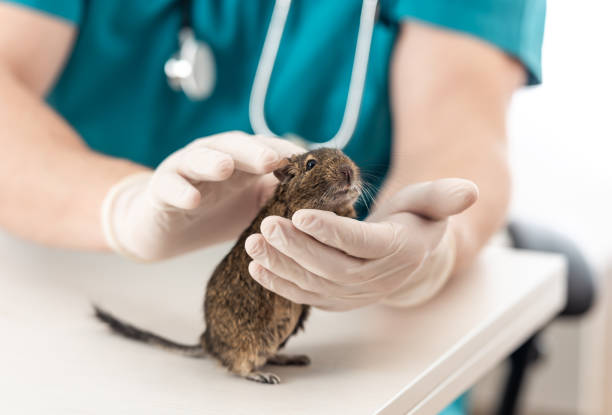
Common Parasites that Affect Degus:
- Mites: Mites are microscopic external parasites that can cause skin irritation and discomfort in degus. They can lead to conditions like mange.
- Fleas: Fleas can also infest degus, causing itching, hair loss, and skin problems.
- Internal Worms: Internal parasites like roundworms and tapeworms can affect your degus’ digestive system and overall health.
Preventive Measures:
To protect your degus from parasitic infestations, consider these preventive measures:
- Regular Cage Cleaning: Maintain a clean living environment for your degus. Regularly change bedding and clean the cage to minimize the risk of parasites.
- Quarantine New Degus: If you introduce new degus to your existing group, quarantine them for a period before allowing contact. This helps prevent the spread of potential parasites.
- Hygiene: Practice good personal hygiene when handling your degus. Wash your hands before and after interacting with them to reduce the risk of transferring parasites.
- Consult Your Veterinarian: Seek guidance from a veterinarian who specializes in small rodents regarding preventive parasite control measures. They can recommend appropriate treatments and preventive measures based on your degus’ specific needs.
- Regular Checkups: Schedule regular checkups with your veterinarian to monitor your degus’ overall health. This includes checking for signs of parasitic infestations during examinations.
Preventing parasite infestations is crucial for your degus’ comfort and well-being. By following these preventive measures and being proactive about their health, you can help ensure that your degus stay parasite-free and enjoy a happy, healthy life.
Routine Health Checks

Regular health checks are a fundamental aspect of responsible degu ownership. Monitoring your degus’ health and well-being on an ongoing basis helps catch potential issues early and ensures they receive timely care. In this section, we’ll discuss why routine health checks are crucial and what to look for during these assessments.
Why Routine Health Checks Are Important:
Routine health checks serve several important purposes:
- Early Detection: They enable you to spot health issues in their early stages when they are often more manageable and less costly to treat.
- Preventive Care: Regular checkups allow you to proactively address potential health concerns and implement preventive measures.
- Establishing Baselines: Over time, these checkups establish baseline data on your degus’ health, making it easier to detect deviations from their normal state.
What to Look for During Routine Health Checks:
When conducting routine health checks, pay close attention to the following:
- Body Condition: Assess their body condition by gently feeling their ribs and spine. You should be able to feel these structures without pressing too hard. An overly pronounced spine or ribs may indicate being underweight, while difficulty feeling them can suggest being overweight.
- Activity Level: Monitor your degus’ activity levels. A sudden decrease in activity may indicate illness or discomfort.
- Eating and Drinking Habits: Keep an eye on their food and water intake. Changes in appetite or thirst can signal underlying health issues.
- Fur and Skin: Examine their fur and skin for any abnormalities, such as hair loss, rashes, or signs of parasites.
- Respiratory Signs: Listen for any abnormal breathing sounds, such as wheezing or clicking, which could indicate respiratory issues.
- Eyes and Nose: Check for clear, bright eyes and a dry nose. Watery eyes or nasal discharge can indicate health problems.
- Teeth and Mouth: Inspect their teeth for signs of overgrowth or malocclusion. Also, look for signs of drooling or difficulty eating.
- Behavioral Changes: Be attuned to changes in behavior, such as increased aggression, withdrawal, or unusual vocalizations.
Consult Your Veterinarian:
If you notice any concerning signs during routine health checks, don’t hesitate to consult your veterinarian experienced in small rodent care. They can provide a thorough examination, diagnose any health issues, and recommend appropriate treatments.
Routine health checks are a proactive measure to ensure your degus’ health and well-being. By staying vigilant and addressing potential concerns promptly, you can help your degus lead long and healthy lives.
Vaccinations (if applicable)

Vaccinations play a crucial role in preventing certain diseases that can affect degus. However, it’s important to note that not all degus require vaccinations, and the need for vaccinations can vary depending on factors like your degus’ environment, health history, and local disease prevalence. In this section, we’ll explore the concept of vaccinations for degus and when they may be necessary.
Understanding Vaccinations for Degus:
Vaccinations work by stimulating the immune system to build resistance against specific diseases. They are typically administered as a preventive measure to protect your degus from diseases that may be prevalent in your area or are known to affect degus.
Common Vaccines for Degus:
While there are no specific vaccines universally recommended for degus, there are certain vaccines that might be considered based on local disease risks and your veterinarian’s guidance. Some potential vaccines include:
- Rabies Vaccine: If rabies is a concern in your area and your degus may come into contact with wildlife, a rabies vaccine may be recommended.
- Adenovirus Vaccine: Adenovirus can affect degus, particularly in regions where it is prevalent. A vaccine may be considered if your degus are at risk.
- Other Diseases: Depending on your location and local disease risks, other vaccines may be suggested by your veterinarian. These could include vaccines for diseases like leptospirosis.
Consult Your Veterinarian:
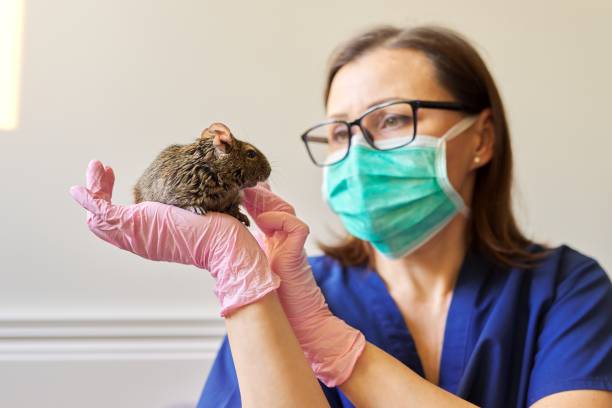
The decision to vaccinate your degus should be made in consultation with a veterinarian who specializes in small rodents. They will assess the specific health risks in your area and your degus’ individual health status to determine if vaccinations are necessary.
Stress Management
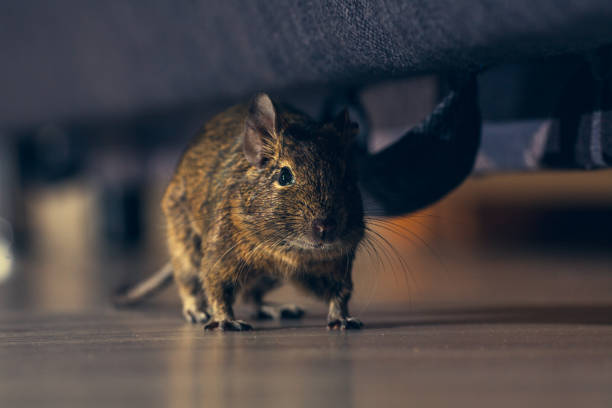
Stress management is a vital component of degu care, as these social and sensitive rodents can easily become stressed in various situations. Chronic stress can have adverse effects on your degus’ health and well-being, so it’s crucial to understand how to minimize stressors and provide a stress-free environment.
Why Stress Management Matters:
Stress can weaken your degus’ immune system, making them more susceptible to illnesses. It can also lead to behavioral problems, decreased appetite, and even a shorter lifespan. Recognizing and mitigating stressors can greatly enhance your degus’ quality of life.
Common Stressors for Degus:
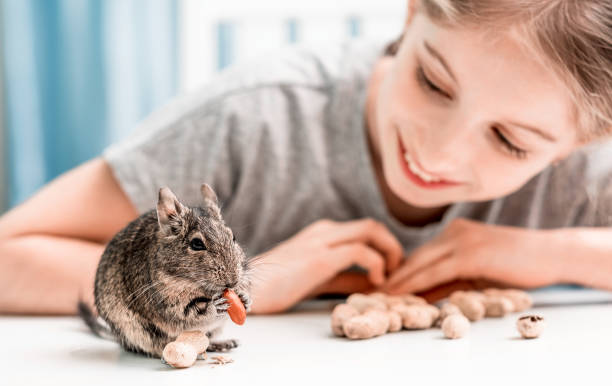
- Loneliness: Degus are highly social animals and can become stressed when kept alone. Consider housing them in pairs or small groups to provide companionship.
- Environmental Changes: Frequent or abrupt changes in their habitat can cause stress. Degus thrive on routine and familiarity.
- Loud Noises: Loud or sudden noises can startle and stress degus. Place their enclosure in a quiet and calm area of your home.
- Handling Stress: Improper handling, especially when degus are not used to human contact, can stress them. Gentle and gradual socialization is key.
Tips for Stress Reduction:

- Companionship: Whenever possible, house degus in pairs or small groups to provide social interaction and reduce loneliness.
- Consistent Environment: Maintain a stable and consistent environment. Avoid frequent changes to their enclosure layout or location.
- Quiet Space: Keep their habitat in a quiet and low-traffic area to minimize exposure to loud noises.
- Gentle Handling: If your degus are not accustomed to handling, introduce them to it slowly and gently. This helps build trust and reduce handling-related stress.
- Enrichment: Provide plenty of mental and physical stimulation through toys, tunnels, and climbing structures to keep them engaged and reduce boredom.
- Proper Introduction: When introducing new degus to your existing group, do so gradually to prevent territorial conflicts and stress.
- Regular Checkups: Schedule routine veterinary checkups to catch and address health issues early, which can reduce the stress associated with illness.
By taking these steps to minimize stressors and create a stress-free environment, you can help ensure your degus are happy, healthy, and content. Remember that a stress-free environment contributes significantly to their overall well-being.
Final Thoughts
Being a responsible degu owner involves continuous learning and adapting to the unique needs and preferences of your individual pets.
Your commitment to their health and happiness is commendable, and your efforts will undoubtedly be rewarded with the joy of sharing your life with these charming and social rodents. As you embark on your journey of degu companionship, may it be filled with countless moments of delight and the satisfaction of knowing you are providing them with a nurturing and enriched environment.

